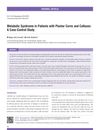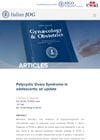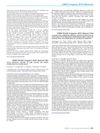 October 2022 in “Linköping University medical dissertations”
October 2022 in “Linköping University medical dissertations” The method shows hair testosterone levels reflect those in saliva, but are affected by various factors and may indicate a risk for heart attack.
 June 2022 in “Journal of the turkish academy of dermatology”
June 2022 in “Journal of the turkish academy of dermatology” People with plantar corns and calluses may have a higher chance of having metabolic syndrome.
 December 2021 in “Journal of oncology research reviews & reports”
December 2021 in “Journal of oncology research reviews & reports” Polycystic Ovary Syndrome (PCOS) can lead to diabetes, heart disease, cancer, and mental health problems.
 December 2021 in “Acta Marisiensis”
December 2021 in “Acta Marisiensis” Insulin resistance increases the risk of developing type 2 diabetes and other health issues.
 May 2021 in “Zbalansovane prirodokoristuvannâ”
May 2021 in “Zbalansovane prirodokoristuvannâ” Some shampoos have harmful ingredients that can cause health problems, but these are needed for the shampoos to work properly.
 April 2021 in “Interciencia médica”
April 2021 in “Interciencia médica” PCOS is a common condition in women that causes various symptoms and health issues, treatable with lifestyle changes and medication.
 October 2020 in “Benha Journal of Applied Sciences”
October 2020 in “Benha Journal of Applied Sciences” Troponin I may help detect heart problems in people with Androgenetic Alopecia.
 June 2020 in “Italian journal of gynaecology & obstetrics”
June 2020 in “Italian journal of gynaecology & obstetrics” The document concludes that PCOS in teenagers is hard to diagnose, influenced by various factors, and should be managed with lifestyle changes and medication.
 February 2020 in “Research Square (Research Square)”
February 2020 in “Research Square (Research Square)” Skin tags in obese individuals may indicate a higher risk of heart disease and diabetes.
 October 2018 in “Journal of Clinical Research in Pediatric Endocrinology”
October 2018 in “Journal of Clinical Research in Pediatric Endocrinology” Children with classic congenital adrenal hyperplasia have thicker heart fat and more heart and blood vessel risk factors, especially if their condition is not well-controlled.
 June 2018 in “Journal of evolution of medical and dental sciences”
June 2018 in “Journal of evolution of medical and dental sciences” Skin problems like excessive hair growth, acne, and dark skin patches can be signs of Polycystic Ovarian Disease, which may also be linked to family history and a risk for diabetes.

The conclusion is that a more comprehensive and precise approach is needed for diagnosing PCOS to address its broader health risks.
 January 2017 in “Elsevier eBooks”
January 2017 in “Elsevier eBooks” Antioxidants may help improve mitochondrial health and could be used to treat diseases related to cell damage.
 October 2016 in “Journal of the Dermatology Nurses’ Association”
October 2016 in “Journal of the Dermatology Nurses’ Association” Polycystic Ovary Syndrome (PCOS) affects 6%-15% of women of reproductive age, causing symptoms like acne and hair loss, and increasing the risk of type 2 diabetes and heart disease; it's managed through diet, exercise, and medications like Metformin and hormonal contraceptives.
 September 2016 in “Springer eBooks”
September 2016 in “Springer eBooks” Looking older on the outside might be linked to aging faster on the inside and can be affected by lifestyle choices and health risks.
 August 2016 in “CRC Press eBooks”
August 2016 in “CRC Press eBooks” Before treating hair loss, it's crucial to diagnose and treat any underlying medical conditions that may be causing it.
 April 2016 in “JAMA Dermatology”
April 2016 in “JAMA Dermatology” Acne is not a key diagnostic feature for PCOS, postadolescent men with acne may have insulin resistance, melanoma patients often have few moles, tumor size in CSCC indicates higher risk of serious outcomes, and hidradenitis suppurativa is linked to higher risk of heart problems and death.
 October 2015 in “Elsevier eBooks”
October 2015 in “Elsevier eBooks” Minoxidil is effective for hair growth and safe for long-term use.
 August 2015 in “Postgraduate obstetrics & gynecology”
August 2015 in “Postgraduate obstetrics & gynecology” Women with PCOS often have metabolic issues like insulin resistance and a higher risk of diabetes and abnormal lipid levels.
 August 2015 in “Postgraduate obstetrics & gynecology”
August 2015 in “Postgraduate obstetrics & gynecology” Women with PCOS often have insulin resistance, abnormal lipid levels, and a higher risk of diabetes and heart disease; lifestyle changes and medication like metformin can help manage these risks.
 July 2015 in “NEJM Journal Watch”
July 2015 in “NEJM Journal Watch” Diagnosing and treating PCOS in young people is difficult.
 July 2015 in “Cambridge University Press eBooks”
July 2015 in “Cambridge University Press eBooks” The document concludes that careful history and physical exams are crucial for accurately diagnosing polycystic ovary syndrome and distinguishing it from other similar conditions.
 January 2015 in “Springer eBooks”
January 2015 in “Springer eBooks” The document concludes that managing PCOS involves lifestyle changes, medication, and monitoring for associated health risks.

The document concludes that accurate diagnosis and management of PCOS are crucial due to its associated health risks.
Women with acne may have a higher chance of having PCOS, which can lead to other health problems.
 January 2012 in “S. Karger AG eBooks”
January 2012 in “S. Karger AG eBooks” The document concludes that transsexual individuals often experience improved quality of life after transitioning, despite higher risks of psychiatric issues and mortality.
 October 2010 in “Journal of Men's Health”
October 2010 in “Journal of Men's Health” Some patients may experience lasting sexual dysfunction, depression, and other side effects from 5α-reductase inhibitor therapy.
 September 2009 in “Annales D Endocrinologie”
September 2009 in “Annales D Endocrinologie” DHEA supplementation may improve quality of life, neuropsychological functions, and sexual satisfaction in individuals with adrenal insufficiency, but more research is needed to confirm its safety and effectiveness.
 August 2008 in “Obstetrics & gynecology science”
August 2008 in “Obstetrics & gynecology science” Polycystic Ovary Syndrome (PCOS) is a complex disorder with both immediate and long-term health effects, including menstrual issues, infertility, and increased risk of diabetes and heart disease.
 October 2007 in “Postgraduate obstetrics & gynecology”
October 2007 in “Postgraduate obstetrics & gynecology” Testosterone therapy can help with androgen deficiency in women but should be used with caution and monitoring due to potential risks.





























